South Australian gardening icon Jon Lamb reflects on 40 years with The Advertiser as he pens his final column
Gardening expert Jon Lamb reflects on his remarkable journey from rural reporter to beloved protector of the plants, as he pens his final column for The Advertiser after 40 years.
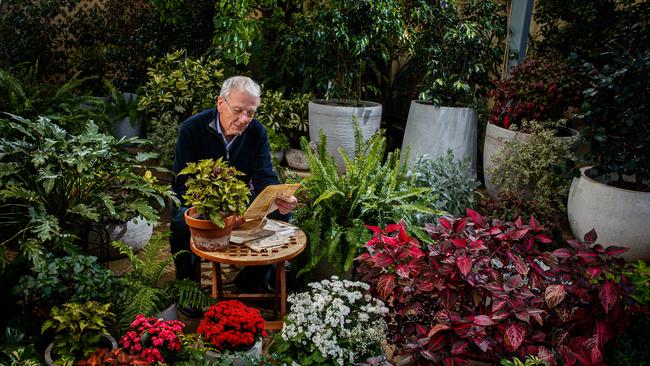
SA Weekend
Don't miss out on the headlines from SA Weekend. Followed categories will be added to My News.
For almost half a century, gardening expert Jon Lamb has supported and nurtured a growing community of green thumbs across the state. Here in an exclusive interview with SA Weekend magazine, he reflects on his career, taking readers from his early beginnings in horticulture, through his time as a young rural reporter at the ABC, past a political detour and then down the garden path. Lamb takes aim at the city planners and developers who have overlooked the benefits of green space and describes climate change as “the biggest challenge facing gardeners”. It’s a sentimental tale of “serendipity” and a “hobby gone mad”.
In the shade of a large ornamental pear tree, 200 carefully selected and pampered pot plants bring life and colour to a drab, modest suburban courtyard in Campbelltown.
This botanical oasis belongs to none other than Adelaide’s king of gardening, award-winning writer, communicator and broadcaster Jon Lamb.
Every plant enjoys quality time with Lamb regularly, when he waters them individually “by dunking them in a large container with all kinds of different plant products”.
“It allows me to look at each plant. And that plant actually tells me how it’s feeling; it talks to me by its leaves,” Lamb says.
“I’m quite happy to talk to my plants, and they talk back to me, by the colour of their leaves. I can tell by the colour of the leaves, have they got enough water or too much water? Or are they hungry? Or they’re thirsty? Do they need to be moved to a different location?
“The observations I make in my own garden I will then relay, in what I write for The Advertiser and how I respond to people on talkback radio.”
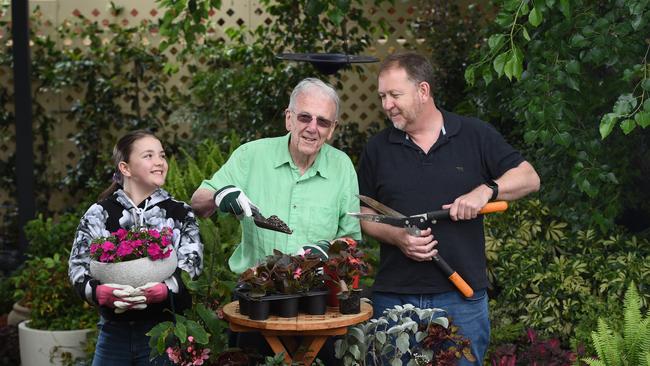
But change is in the air. Forty years, almost to the day, since he began writing about gardening for The Advertiser, Lamb is stepping down. Today’s column is his last. The first, published on October 24, 1980, promoted waterwise native plants, long before the drought-induced water restrictions.
In his first book, The Weekend Gardener (1983), Lamb explained that harsh, hot summers and poor soils called for a less formal approach to gardening, using groups of Australian native plants and selected exotics: “Like many South Australians I believe it is time we broke away from the more traditional ideas and developed a gardening style of our own; one that is in harmony with our climate and soils,” he wrote.
Lamenting a lack of literature on the state’s climate and soils, he filled the void with thousands of articles, gradually convincing readers that not only did it made good sense to consider Australian alternatives, especially when growing plants in the driest state on the driest inhabited continent, but they looked good and offered many other benefits too.
Lamb has always enjoyed problem-solving, being able to identify an issue and offer a solution. In his thoughtful, caring and joyful way, he has answered gardening questions great and small, countless times. With a twinkle in his eye and a whistle on his lips, he offers friendly advice and words of wisdom to those in need.
When he doesn’t immediately know the answer, he knows how to think it through, working through an issue from first principles, using logic and reasoning to solve a problem.
If that fails, he knows where to turn, drawing on a large network of contacts in the nursery and garden industry, in agriculture and horticulture, even science or meteorology. He also has an extensive library of books that he draws on copiously.
His sharp, inquiring mind was shaped by his father, growing up on an apple and pear orchard in Gippsland, Victoria, with one older brother and two younger sisters.
“On the orchard, I was the fourth generation. Dad and grandfather and great-grandfather were all orchardists,” Lamb says.
“And Dad taught me to be curious, to say, ‘Why is it so?’ That’s still part of me now. Very, very strongly.
“Dad didn’t have an education, he didn’t even get to high school. None of them, none of that generation did. But he believed that the answers to the question, ‘Why is it so?’ were in science, and he wanted me to go to Burnley, so I went to Burnley Horticultural College in Melbourne.”
The plan was that he would complete his certificate in horticulture and then go home to work on the orchard.
“When I did come home, dad allocated 10 acres of the orchard to me and then the next year, we got wiped out with hail. The year after that we had a massive drought,” Lamb says.
“And so the orchard wasn’t big enough for two people, so I joined the ABC.”
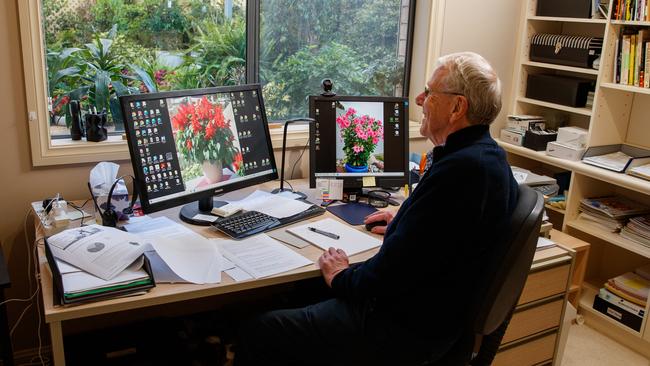
As a young man of about 20 years of age, Lamb came to the attention of the ABC as a “very, very, very keen member of the Young Farmers organisation”, with his team having won the state public speaking championships four years in a row and also the state debating championships, on a number of occasions.
“I liked talking I suppose,” he says. “And because we had won the state public speaking competition, I was interviewed by the ABC Rural department and they said, ‘Oh, we’re looking for trainees at the moment. Would you like to apply?’ And I did.”
After two years as a trainee, starting in Melbourne and then working his way through the specified regions in Victoria and SA, he landed a full-time position as a rural officer in Renmark, where he stayed for six years (1963-69).
He researched, produced and presented a daily morning program and also contributed to the news bulletin, taking every opportunity to interview fruit and vegetable growers, and put their questions to agricultural research scientists.
“I think I still hold the record for the longest-serving resident rural officer, because in some areas, like Renmark, you’d have somebody move in and move out. Most people didn’t like it, but it was all horticulture and so I was in my element,” Lamb says.
But he did have his eye on the most prized position at ABC Rural, the role of executive presenter at the Country Hour in Adelaide.
When the opportunity came up in 1969, he grabbed it with both hands.
He also did the weather on TV twice a week at the end of the evening news bulletin and hosted another weekly TV program called “To Market, To Market”.
“Once a week we’d go around the wholesale markets, find out what the price was and then go around the shops to see if they’re selling a rip-off or not,” Lamb says.
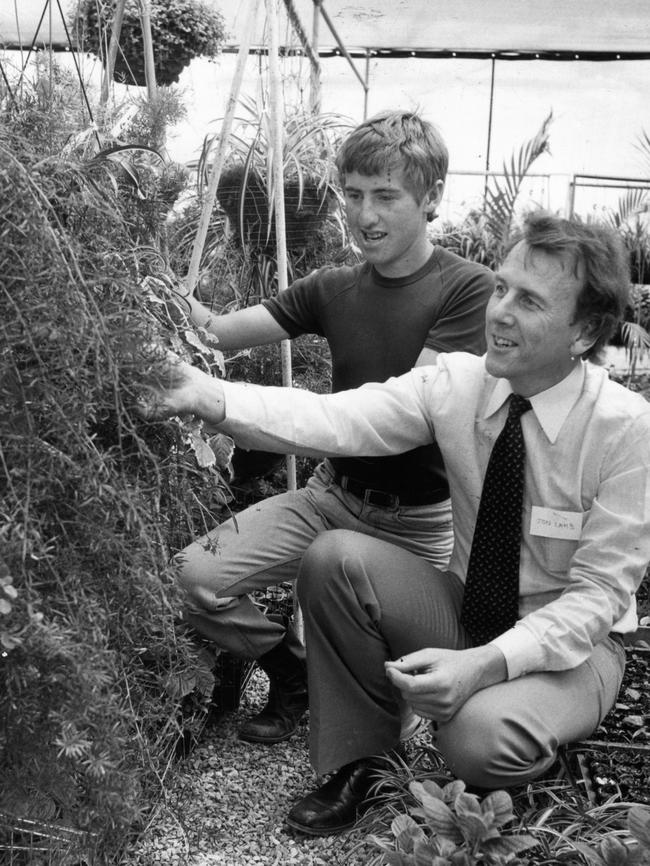
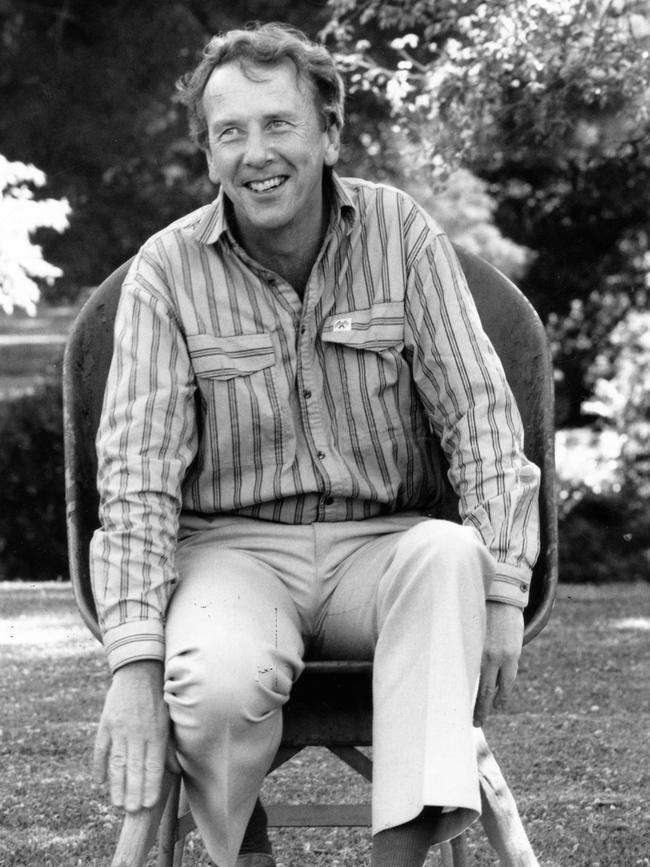
Then, out of blue, SA Senator Chris Schacht called with an offer he couldn’t refuse: “Hey Lamby, why don’t you come and be a press secretary? We’ll make it worth your while …”.
So, in 1972, Lamb left the ABC and worked for two Labor State Ministers of Agriculture, first Tom Casey and then Brian Chatterton, who took the portfolio in 1975.
Lamb’s home in St Peter’s became a hub for Labor Party agricultural policy development.
“They used to have policy meetings in our dining room and some of the big issues, like truth in labelling on products, came from Brian Chatterton,” Lamb said.
“Back then you could go and buy a bag of say, lucerne seed and they could put anything in it. And, you know, it might only be sort of 80 per cent seed and the rest is crap.
“So they brought in regulations to say you’ve got to put in what’s on the label. And that became a tremendously important piece of legislation.”
Lamb loved working for the “super-intelligent” Chatterton, but after “a monumental argument with the Minister’s wife” in 1977, Lamb left his political post and returned to work as a rural reporter, this time for the Stock Journal, where he was on staff until 1986 and left to do his own thing.
He scored a trip overseas, what’s known in the game as a junket, where he followed Prime Minister Bob Hawke and his entourage across the globe and interviewed US President Ronald Reagan.
That interview was cut short by minders when Lamb started asking too many questions about agricultural policy and trade tariffs. “Because I knew the background, I was being a real smartass, asking these real tough questions, so they stopped the interview and I got wheeled out,” he says.
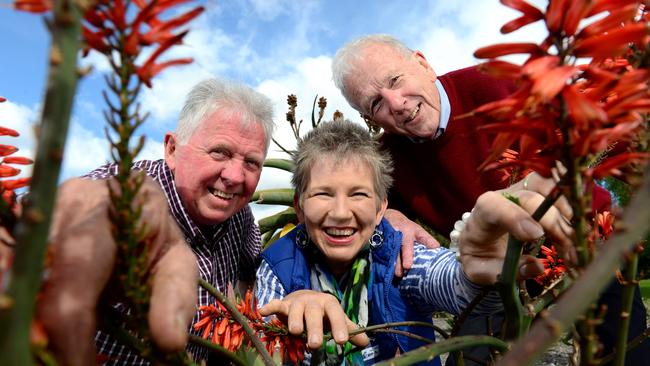
With a family background and technical qualification in horticulture, more than 10-years experience as a rural reporter at the ABC and now the Stock Journal plus five years as a press secretary to two Ministers of Agriculture, Lamb knew a great deal about growing things.
So when ABC management told the ABC Rural department to start a gardening program, the supervisor at the time asked Lamb if he would like to become the first person in Australia to have a dedicated talkback gardening show. That show is still running in much the same format, on ABC Adelaide 891 every Saturday morning from 8.30am to 10am.
A few months later, The Advertiser invited him to take over the gardening column, which was also weekly, on a Friday at the time, so “talkback led to The Advertiser and people just assuming I knew a lot about gardening”, Lamb says.
He was also the “spare parts person for Jim McCarter” who ran The Advertiser’s Rural Weekly supplement: “When Jim used to go on holidays I got wheeled in to sort of take over,” Lamb said. He was never a permanent member of staff, he was a columnist who submitted his weekly gardening column and occasionally filled in on a casual or contract basis when the section editor was away.
After leaving the Stock Journal, while also writing for The Advertiser and doing the talkback gardening show on ABC radio, he worked as a freelance journalist and communications consultant.
With the Grains Research & Development Corporation, he developed the successful South Australian crop extension program “Right Rotations”. It’s definitely a highlight of his career and he takes great pride in the knowledge that he helped farmers access the expertise of the best and brightest scientists, learning how to identify and manage pests and diseases, particularly root diseases, while taking better care of the beneficial microorganisms in the soil, boosting organic matter and, ultimately, lifting production.
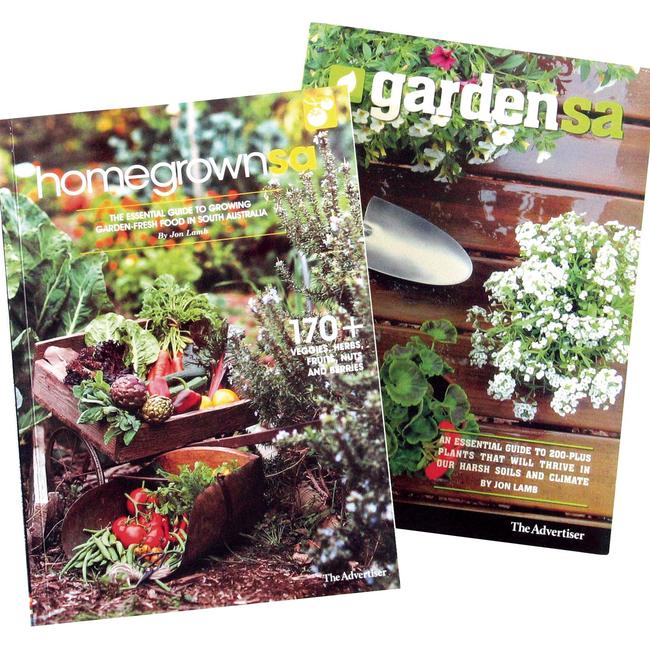
Over seven years, Right Rotations reached more than 2200 farmers through 110 regionally based farmer groups. The overwhelming success of the program led to similar research extension activities, tours and field days. CSIRO senior principal research scientist in soil microbiology, Dr Gupta Vadakattu was roped in during the 1990s.
“Of course you can’t say no to Jon Lamb, so I gave these talks in the places that he organised,” Vadakattu says.
“I know him very well, because in those days we drove around from place to place, so I sat with him in the car for hours and days and days.”
Vadakattu says Lamb has a knack for knowing what he can extract from an individual, in order to deliver the goods to his audience.
“He’s very, very good, I have not seen anybody like that,” Vadakattu says.
“He somehow sees the potential of people and uses it for the purpose and he also is very good at distilling science, or research, to farmer needs.”
Lamb, in turn, says he learned the complexities of biology from Vadakattu and gained a greater appreciation of how to use the natural organisms to manage farms or gardens. That tempered his use of chemicals, pesticides and insecticides, which were all the rage in the early days of home gardening for pleasure.
Now he takes care to offer home gardeners both an organic solution, where possible, as well as a chemical solution, to those particular problems.
But it’s not enough for some people, Lamb says, and one of the negatives of his role has been the harassment from organic crusaders and zealots who believe all chemicals should be banned.
At the SA Research and Development Institute, principal scientist in Climate Applications, Dr Peter Hayman, says it’s fair to say Lamb helped to introduce many South Australians to the concept of climate change, as the heat of summer grew more intense, drought more severe and rain less reliable.
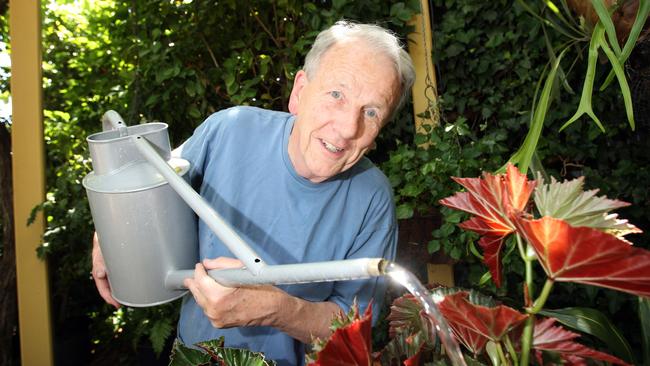
“He’s acknowledged climate change and these heat events in summer and he’s communicated ways for Adelaide gardeners to manage that,” Hayman says. “But he’s also sought the growers to give feedback on what works and what doesn’t work.”
Using high quality data from the Bureau of Meteorology Australian climate change site network, Hayman explains how the SA climate has changed since Lamb began writing for The Advertiser.
“If we just compare the year 1980 to the year 2020 this invites the correct criticism that you shouldn’t compare individual years,” Dr Hayman says.
“So in 1980, if Jon Lamb looked at the previous 20 years, 1960 to 1979 and compared this with the 20-year period 2000 to 2019, Adelaide is more than one degree warmer, 1.14 degrees, with spring temperatures 1.8 degrees warmer.
“Over this same period there have been dry years and wet years, in recent times more dry years than wet. Jon dealt with some extremely wet years like 1992 and 2016, and droughts in 1982, 1994, and then the Millennium drought, 2002 to 2010, and associated water restrictions.”
Lamb guided readers through the difficult dry times with practical advice to aid plant survival, such as the best use of water, mulch and shade. But he also gradually introduced the idea that some, like silver birch trees, are simply struggling and were best left behind. “A lot of the traditional, much-loved plants will be no longer grown because they won’t be able to tolerate the extremes of heat,” he says. “For silver birch, it’s already happening.”
Lamb describes climate change as “the biggest challenge facing gardeners” and while many have adapted, quite quickly, to rising temperatures and water shortages, there’s more to come.
“As the seasons change, it’s going to have a profound change on the kind of insects and the kinds of diseases we experience in the garden, so some problems will go away and others will occur,” Lamb says.
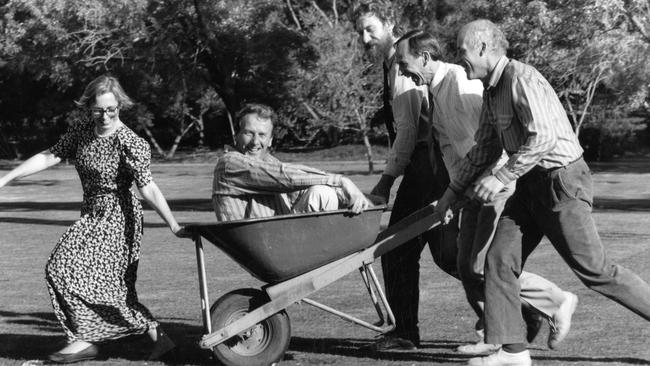
On the upside, elm leaf beetles are cooked on the tree when the temperature reaches 40C and it’s quite likely aphids will disappear because they don’t like the heat either, giving natural predators a chance to get them under control.
But fungal diseases will become more of an issue in wetter years, especially if the rain comes in the warmer months and new pests could arrive at any moment.
Lamb has been waging war against the citrus gall wasp ever since it arrived in SA from interstate, possibly aided by climate change.
He announced the terrible news in The Advertiser on August 5, 2011 and he has been campaigning ever since, rousing gardeners with a consistent clarion call to action.
As Lamb will tell anyone who will listen, the warm-climate wasp is a native insect that was confined to the eastern states, particularly the warmer climates of Queensland and northern and central New South Wales, until warmer weather enabled it to spread.
Every winter he prompts home gardeners to search their citrus tree branches for the telltale thick round lump. Each gall houses up to 100 tiny bark-feeding larvae.
Towards the end of winter they pupate and in early spring, they emerge as adult citrus gall wasps, spreading further across the suburbs. The pest can damage or kill the tree so it’s critical to remove the galls before the wasps emerge, or paint them with horticultural glue to trap them inside.
Looking back over his long career, Lamb sees “three very distinct eras of gardening”. First there was the era of gardens for convenience, then came gardens for pleasure and now, gardens for living.
The shift towards gardens for living has arisen in part because many people have smaller backyards. Lamb is an example of this, having downsized a few years ago from a 200-year-old house and “magnificent” garden at St Peters, with three glasshouses, a grand pergola and vegie patch, to a 20-year-old cosy courtyard compromise.
Every morning he can be seen scowling over fences on dog walks with his anxious but adorable corgi Zoe, 3. The suburb that was once a hub of horticulture, peppered with market gardens on the banks of the River Torrens, has been carved up into smaller and smaller subdivisions, with a higher rate of urban infill than almost anywhere in Adelaide. Lamb says far too many people have “sold off their heritage and in its place are these dirty great big boxes”. It’s a similar story in many suburbs and in the city, he says, high rise buildings are going up and space is at a premium.
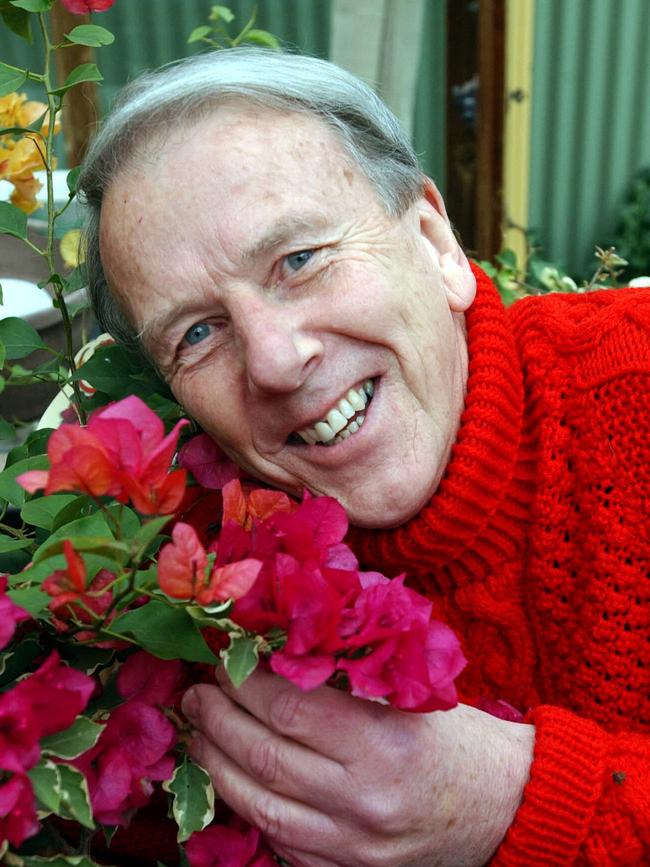
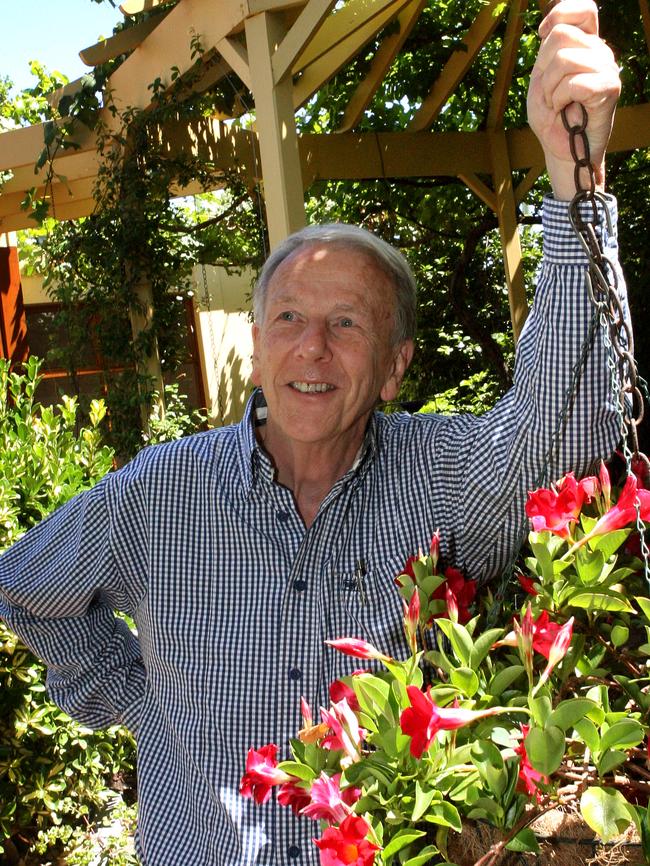

“I am very, very critical of the planners, the governments, not realising the importance of gardening,” Lamb says. “Where some people will make more money, by having more houses per square metre, per square mile, or whatever it is, they have overlooked the tremendous financial benefit of people having an outdoor area, a garden, something to react with, to live with. And the financial benefit of that, in terms of health and welfare, to me far outweighs the profit that people are making out of chopping the gardens up into small spaces.”
Lamb says he knows a lot about big scale traditional gardening but much less about courtyard gardening, so he’s been experimenting with lots of pots. Arranging them and rearranging them. Creating pathways for two little dogs to play hide-and-seek.
It keeps him entertained, but in a way, he’s out of his comfort zone.
“I’ve written constantly about the things I know a lot of and the gardens of tomorrow are changing, I think it’s time that somebody younger and with fresher ideas took over,” Lamb says.
“I mean, I like to be the best at what I’m doing, you know, and I’ve been given lots of awards for being the best at what I do. I don’t know that I’ve got enough left in me to start all over again on a new era.
“It’s time for somebody else, who’s been brought up with what’s going on. And they’ve got time to investigate: What are the answers, the solutions to the problems that people have?”
Having just celebrated his 80th birthday, the self-confessed King of Gardening in Adelaide feels the time has come to start winding down. Although he’s reluctant to speak about his private life, Lamb acknowledges all three of his sons have pursued other careers: Andrew in Adelaide is a lawyer; Geoff in Melbourne is a computer systems engineer in the banking sector; and Matt in Perth works in computer security. And while the younger two have a side-interest in gardening, they won’t take their father’s crown.
“Andrew is the anti-gardener, he has no gardening genes at all. To him, the perfect lawn is green cement,” Lamb says.
But there is hope for the next generation. Scarlett, 11, is the youngest of five grandchildren and the only one in Adelaide. She says it’s “really fun to come into the garden with Grandpa and plant pots”.
“From a really young age I was always getting involved and taking a flower home with me every time I left,” Scarlett says. “That was when he was in his old house with a massive garden.”
The Year 6 student at Pulteney Grammar School has ambitions to become an obstetrician, or a midwife, because she likes helping people.
“I don’t think I’ll be a big gardener but I think I’ll definitely have plants around the house,” she says. “It gives the house like a ‘chill’ feel, it just makes it more comfy. It’s a good use of space.”
For the time being, Lamb remains presenter of the ABC’s highly rated Saturday Talkback Gardening program. He will also continue to co-publish “Good Gardening”, a free, weekly, web-based gardening newsletter.
“I love doing what I do. I like writing, I like broadcasting and I like communicating,” he says. “I’d like to think I’m a super person, you know, go on forever.
“It’s a strange time, there’s a whole career behind me and I’m having to come to grips with the fact it’s coming to an end and I don’t want it to end. But I need to be aware that I’m not as efficient and smart as I used to be, and family is important too.”


